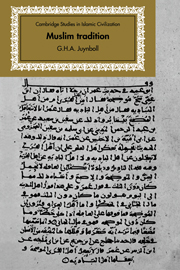Book contents
- Frontmatter
- Contents
- Preface
- Note to the Reader
- Introduction
- 1 A tentative chronology of the origins of Muslim tradition
- 2 The role of qāḍīs in the spreading of traditions
- 3 The man kadhaba tradition and the prohibition of lamenting the dead. An investigation into mutawātir traditions
- 4 An appraisal of muslim ḥadīth criticism. Rijāl works as depositories of transmitters' names
- 5 ‘Accepting traditions means knowing the men’
- Appendix I
- Appendix II
- Appendix III
- Appendix IV
- Appendix V
- Bibliography
- Index (glossary)
4 - An appraisal of muslim ḥadīth criticism. Rijāl works as depositories of transmitters' names
Published online by Cambridge University Press: 04 August 2010
- Frontmatter
- Contents
- Preface
- Note to the Reader
- Introduction
- 1 A tentative chronology of the origins of Muslim tradition
- 2 The role of qāḍīs in the spreading of traditions
- 3 The man kadhaba tradition and the prohibition of lamenting the dead. An investigation into mutawātir traditions
- 4 An appraisal of muslim ḥadīth criticism. Rijāl works as depositories of transmitters' names
- 5 ‘Accepting traditions means knowing the men’
- Appendix I
- Appendix II
- Appendix III
- Appendix IV
- Appendix V
- Bibliography
- Index (glossary)
Summary
Lā aʿlamu li′llāḥi qawman afḍala min qawmin yaṭlubūna hādhā ′l-ḥadīth wa-yuḥibbūna hādhihi ′s-sunna wa-kam antum fi ′n-nās? Wa ′llāhi la-antum aqallu mina ′dh-dhahab.
Sulaymān b. Mihrān al-Aʿmash in Rāmahurmuzī, Al-muḥaddith al-fāṣil, p. 177.Introduction
A study dealing with the chronology of the origins and early development of ḥadīth cannot, of necessity, avoid dealing with the origins and early development of ḥadīth criticism. The present and the following chapters will be devoted to this issue.
In this chapter the first element of a ḥadīth transmitter's biography in the rijāl lexica, his name(s) and/or genealogy, will be studied; the following chapter will be devoted to the biographical information of a transmitter and the assessment of his skill in transmitting traditions.
As already indicated in Chapter 1, the famous traditionist Shu'ba b. al-Ḥajjāj, who died in 160/776, was the first to scrutinize ḥadīth transmitters in Iraq or rather as it turned out in the entire Muslim world. He was soon followed in this skill by Yaḥyā b. Sa'īd al-Qaṭṭān (d. 198/813), Aḥmad ibn Ḥanbal (d. 241/855) and many others. Their activities were eventually put down in writing and this gave rise to a new genre of literature, the ṭabaqāt works. In these works the transmitters are arranged according to generation and place of residence. The first great work belonging to his genre which has been preserved is Ibn Sa'd's Kitāb aṭ-ṭabaqāt al-kabīr.
- Type
- Chapter
- Information
- Muslim TraditionStudies in Chronology, Provenance and Authorship of Early Hadith, pp. 134 - 160Publisher: Cambridge University PressPrint publication year: 1983



